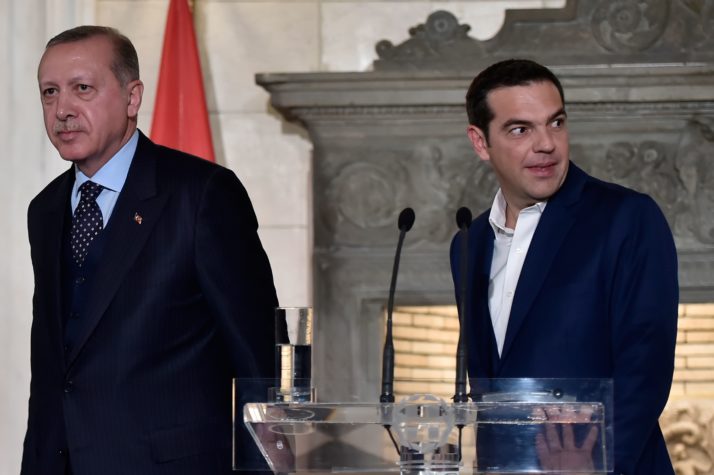In Landmark Visit, Erdogan Calls for Revising Turkey-Greece Border
In a landmark visit to Greece to resolve contentious issues and lasting disputes that bedeviled a not-so-smooth relationship between two countries, President Recep Tayyip Erdogan instead further stoked inflames of tension after he renewed his call for revising borders.
President Erdogan said Lausanne Treaty that settled territorial disputes after the end of Turkish-Greek War that led to the birth of the Turkish Republic in 1923 should be updated.
His comments drew the ire of hosting Greek leaders, consigning what otherwise could be a very constructive visit into a doom from the very beginning.
Points of contention appeared to be prevalent despite gestures of goodwill and pledge for further cooperation during Turkish president’s historic visit to Greece.
The visit by Mr. Erdogan, who became the first Turkish president visiting Greece in 65 years, got off to a rocky start by all means.
“We agreed to resume talks on confidence-building and security measures,” Greek Prime Minister Alexis Tsipras said at a news conference after a long meeting with Mr. Erdogan.
The longtime Turkish leader had said Athens was neglecting the minority with Turkish origins living in northern Greece.
He also accused the European Union of ignoring promises of financial support given last year in return for Turkey’s help in stemming refugee flows to Europe.
Greek President Prokopis Pavlopoulos, one of the country’s foremost legal experts, said Athens had no intention of revising the 1923 Treaty of Lausanne, a defining document in Greek-Turkish relations, as Mr. Erdogan has repeatedly suggested.
“This treaty is non-negotiable for us… it requires no revision nor update,” he said.
Separately, Mr. Tsipras joked that another nine countries would have to be chased down to revise the treaty, including Japan.
But Mr. Erdogan insisted that agreements can be “updated” and claimed that Greece was failing to adhere to the treaty in respect to the Muslim minority.
Contrary to the treaty, Athens appoints religious jurists known as muftis instead of allowing the local community to do so, the Turkish leader said.
“Protecting the rights of our fellow ethnic (Turks) is a top priority for us,” he said.
The Greek prime minister countered by urging Mr. Erdogan to speed up social reforms in Turkey, where many are still imprisoned after a crackdown by his government that followed the attempted army coup last year.
“I invite you to open a new chapter in Greek-Turkish relations,” Mr. Tsipras said. “If you do not accept, it will work against our peoples… and EU-Turkish relations.”
President Erdogan, who visited Greece twice as prime minister, in 2004 and 2010, will travel privately Friday to the northeastern region of Thrace where the Muslim minority lives.
Further souring the two-day trip, Mr. Erdogan said in an interview on Wednesday that airspace and territorial borders could be “improved”.
Relations have been plagued by territorial disputes in the Aegean, with the two NATO allies nearly going to war in 1996 over a cluster of uninhabited islets.
There are often confrontations when Turkish warplanes enter airspace that Greece claims as its own, prompting Greek authorities to scramble jets in response.
‘Delayed justice’
A more recent bone of contention is Greece’s refusal so far to extradite eight Turkish officers who fled to its territory last year after allegedly participating in the failed coup against Mr. Erdogan.
The Greek Supreme Court has blocked the extradition of the officers, and the Turkish leader lamented that taking the legal route “takes longer”.
“Terrorists, when they are detained in Greece, they should be extradited to Turkey,” he said. “Delayed justice is no justice.”
Mr. Tsipras said the Greek state had to respect judicial rulings and promised that the suspects would receive a fair trial.
‘A wide divide’
The uneasy relations between Turkey and Greece date back to the creation of the modern Turkish republic out of the ruins of the Ottoman Empire.
Mr. Erdogan’s Islamic-rooted Justice and Development Party (AKP), which came to power in 2002, sought a more pragmatic relationship based on trade and tourism, and Greece became a key backer of the Turkish bid to join the EU.
Athens is unhappy over Turkey’s upkeep of Byzantine heritage in Istanbul, the former Constantinople, including the Hagia Sophia, which is officially a museum but has seen an uptick in Muslim worship in the last few years.
Another festering sore is the island of Cyprus, whose northern section still hosts Turkish troops following the 1974 intervention in response to an Athens-inspired coup aimed at uniting it with Greece.
Much-touted peace talks this year to reunify the island ended without a breakthrough.
In a move seen by Turkish commentators as a gesture to Ankara ahead of President Erdogan’s visit, nine suspected members of the Marxist Revolutionary People’s Liberation Party-Front (DHKP-C), branded a terrorist organization by Turkey, were charged by a Greek prosecutor last week.




Comments are closed.